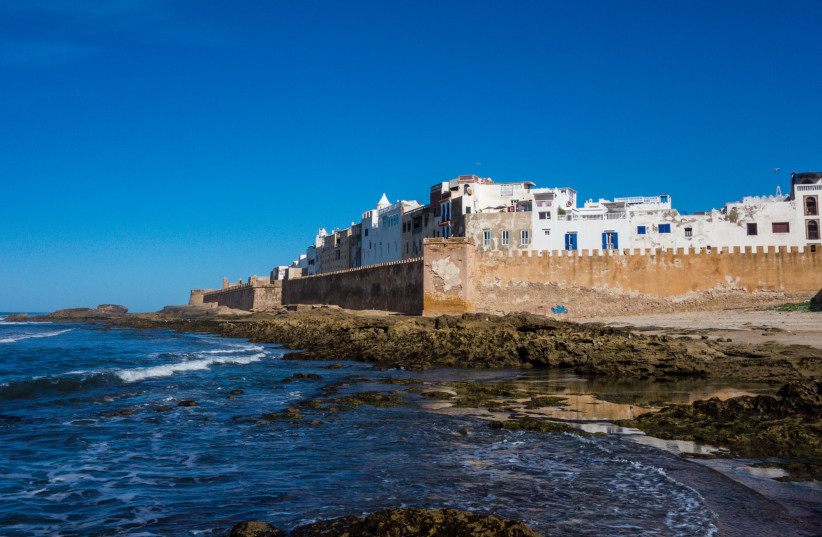Arkia Airlines and Morocco’s tourism agency recently announced the launch of direct flights between Tel Aviv and the Atlantic port town of Essaouira.
Although this decision has its economic motivations and indeed reflects the progress achieved in the official rapprochement between Israel and Morocco, there is a bigger story behind it.
This is the story of a small town that, slowly but surely, has managed to conquer the hearts of many Israelis based on joint heritage and historical connection between Jews and Muslims. In fact, Essaouira is an invitation to reconsider the proper place and role of culture in policy making, and of the power to create the people-to-people relationships for which we long for between Israel and the MENA region.
Jewish merchants in Morocco
Jews first came to Essaouira in the 18th century at the invitation of Sultan Mohammed ben Abdallah. They were known as the “Sultan’s merchants” and some even played a diplomatic role in developing Morocco’s ties with Britain, France, Austria, and other European powers.
Meir Maknin, for example, was a successful merchant who served as the Sultan’s envoy to Britain. At the beginning of the 20th century, Essaouira became a thriving Jewish center and one of the only cities in the Muslim world with a Jewish majority.

The Jewish community numbered about 12,000 and boasted more than 30 synagogues. In addition, the community also contributed to the economic development of Essaouira as a port city and an important economic hub.
When the Jews departed Essaouira in the early 1960s, they left behind them a human, economic and cultural void – there was a joint sense of absence experienced both by the Jews who left as well as by their Muslim neighbors who were left behind. Thus, the current growing tourism movement from Israel to Essaouira was born of longing – an emotion that goes beyond mere nostalgia or a fleeting momentary sense of loss.
Longing is a powerful force, which serves as a compass directing and generating movement, both physical and mental, towards spaces of belonging where important assets such as home, family, community, and culture were left behind. It is a movement of renewal striving to return to the source to recreate a more authentic and harmonious self and future. Longing transcends boundaries and common conventions, it connects worlds and people around common ground and motivates them to action.
Essaouira became an attraction for Israelis even before the recent resumption of official ties, thanks to the open door that Morocco kept for tourists from Israel along the years and its recognition of the Hebraic culture as an integral part of the Moroccan national story. This recognition was reflected in the renovation of Jewish heritage sites such as the Slat Lkhal Synagogue in Essaouira; and the establishment of Beyt Dakira, inaugurated by King Mohammed VI, which tells the multicultural story of the city, and includes an institute for the study of Jewish law.
The Andalusian Atlantic Festival has been held in Essaouira since 2003, allowing visitors to experience the Andalusian “golden age” in its contemporary version. Beyond the Jewish story, Essaouira has succeeded in turning its cultural assets into an engine of urban development and economic growth. To better understand the secret of this success one should go back to 1998 to the founding moment of the international Gnaoua Festival. Beyond its cultural impact, the music festival has changed the face of the city through the development of the tourism and the local services sectors. This year’s festival attracted more than 400,000 visitors, six times the total population of Essaouira, which currently numbers around 70,000.
The festival’s popularity has led to an increase in the number of tourist accommodations available, from 10 (in 1998) to 160, and the number of restaurants has grown from seven to more than 60. To ensure continuous tourism flow, additional events and festivals were established in Essaouira, forming a dedicated community of those captivated by its charms and return to it time after time.
Essaouira is not free of challenges – there are still economic gaps, a need to diversify the urban economy, and unemployment during periods when tourism is less significant. Still, the continuous tourist traffic from around the world is a key to success. At the end of the day, tourists who come to consume culture also bring with them knowledge and new ideas, investments, and opportunities for development.
The circumstances that enabled the establishment of direct flights between Tel Aviv and Essaouira serve as evidence of the importance of cultural and civic ties in promoting relations between Israel and Morocco, as well as of the importance of emotions in the framework of political activity.
Culture helps foster trust, common ground and a sense of belonging. It allows us to form a stronger and resilient strategic story for our partnership. Longing can serve as a mean to connect peoples and as a tremendous engine to encourage civic engagement.
Finally, the cultural approach of Essaouira’s economic growth cannot be fully understood without mentioning André Azoulay, senior adviser to the present king and to his father King Hassan II before him, one among distinguished group of senior officials who came from the city of Essaouira and served the kingdom of Morocco. Azoulay (current president of the Anna Lindh Euro-Mediterranean Foundation for the Dialogue Between Cultures) never stopped believing that Essaouira could serve as a lighthouse of coexistence and multiculturalism in our region, and as an example to the worthy role that culture deserves in policy making.
The writer is a Mitvim Institute researcher and entrepreneur, founder and CEO of MIGDALOR Consulting for building partnerships between Israel and Morocco. She was among the founding members of the Israeli Mission to Rabat where she was leading the economic and academic affairs.
